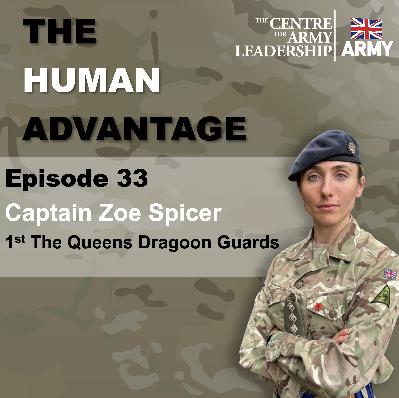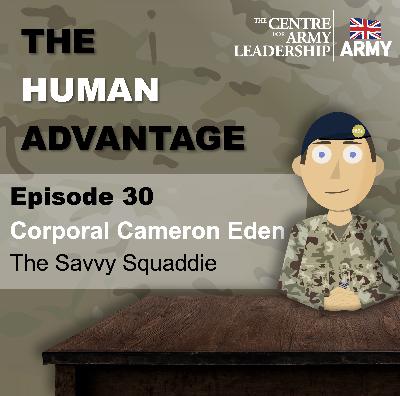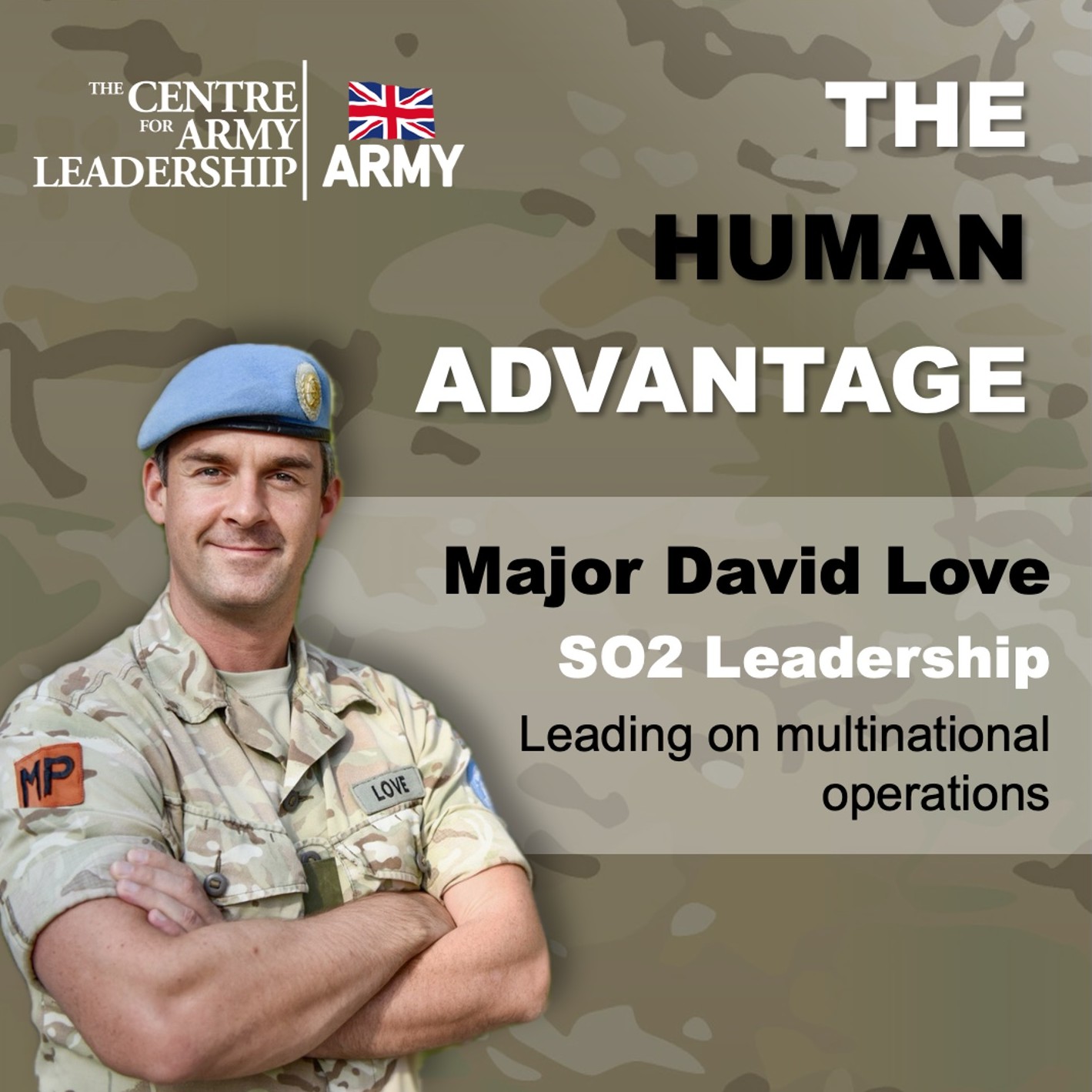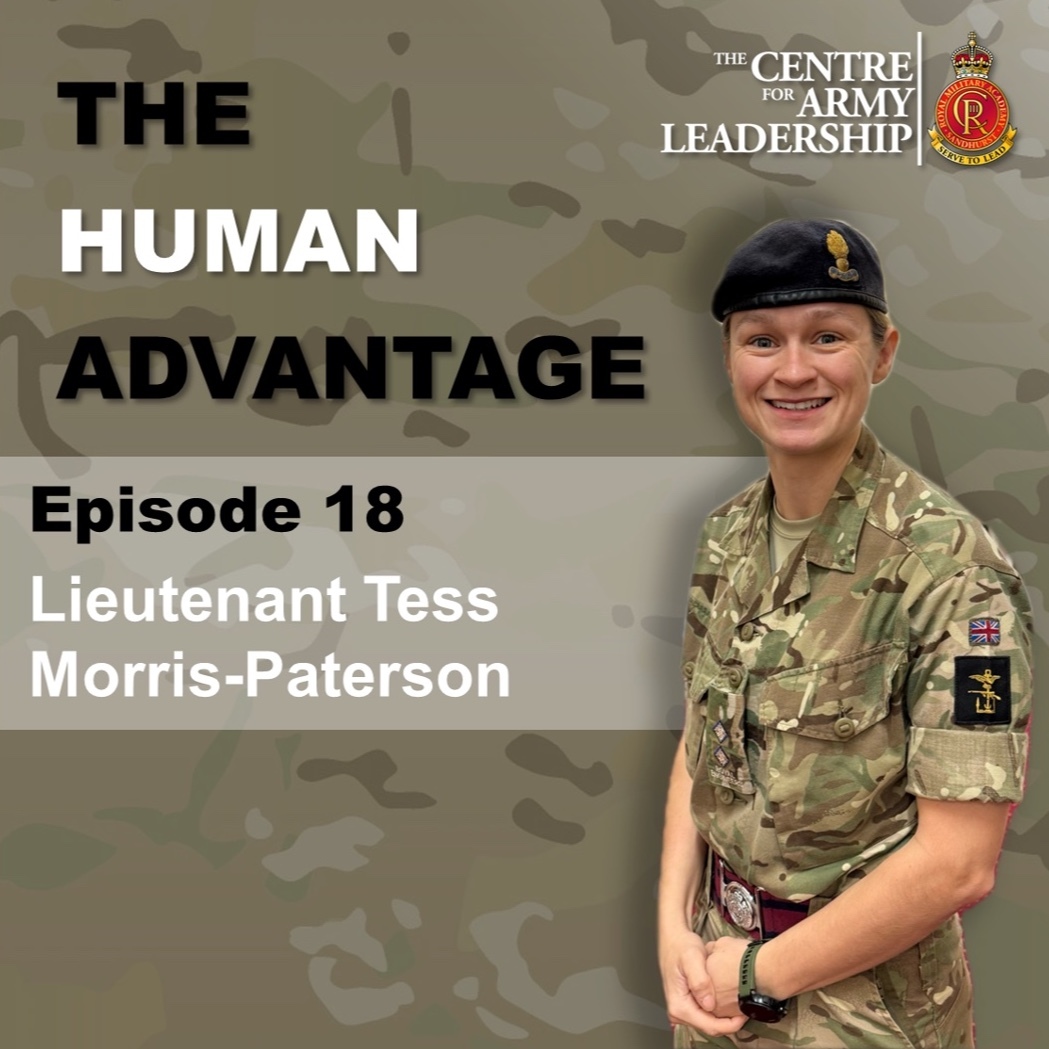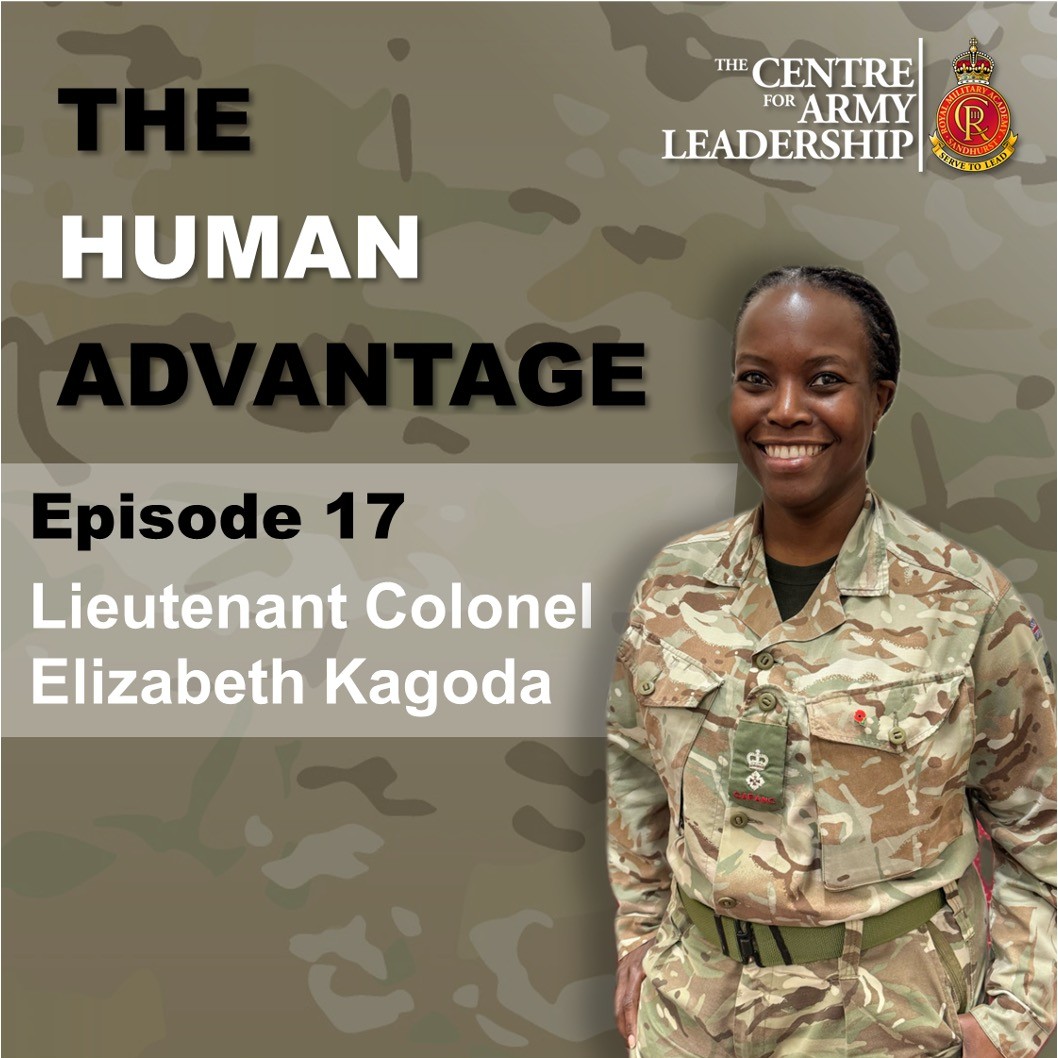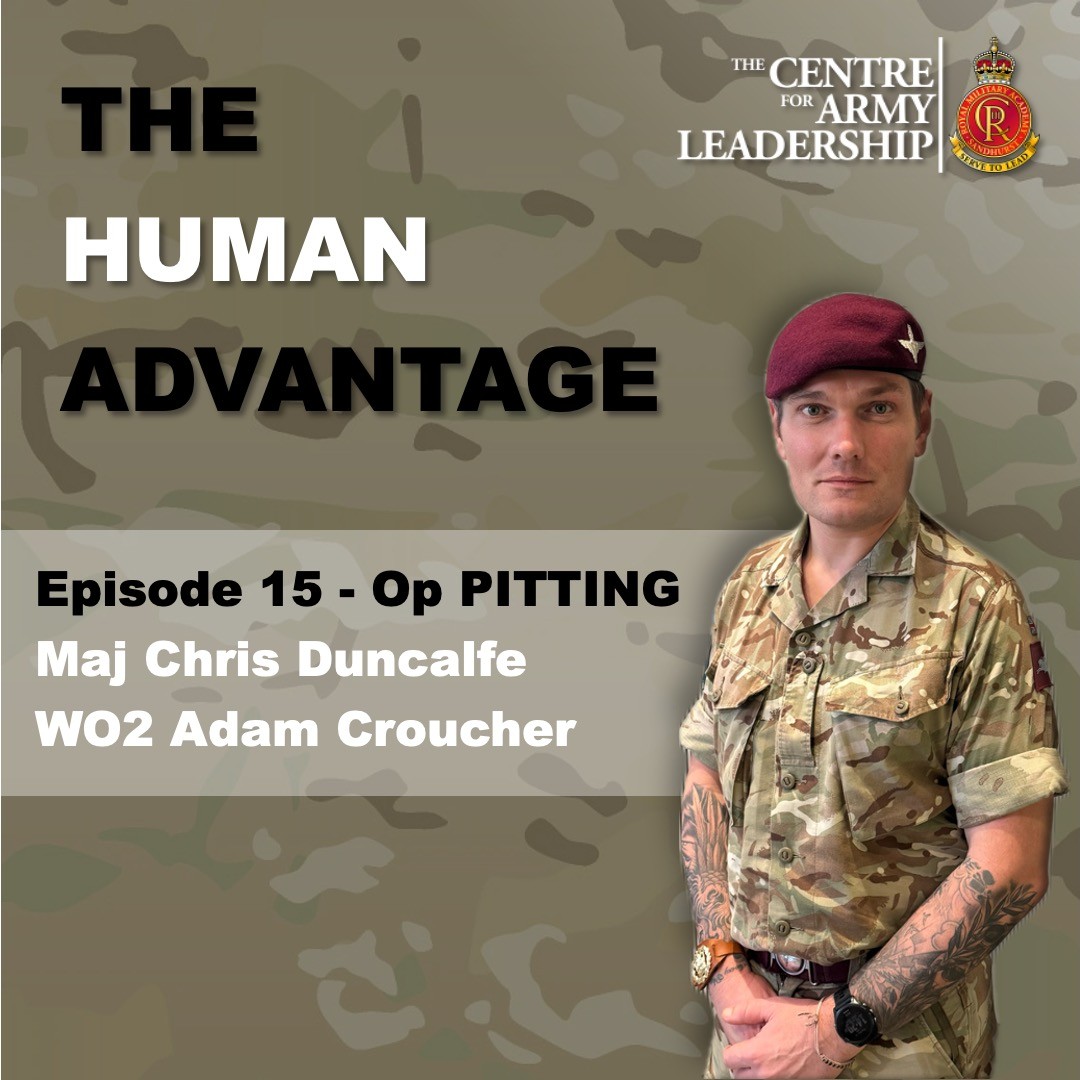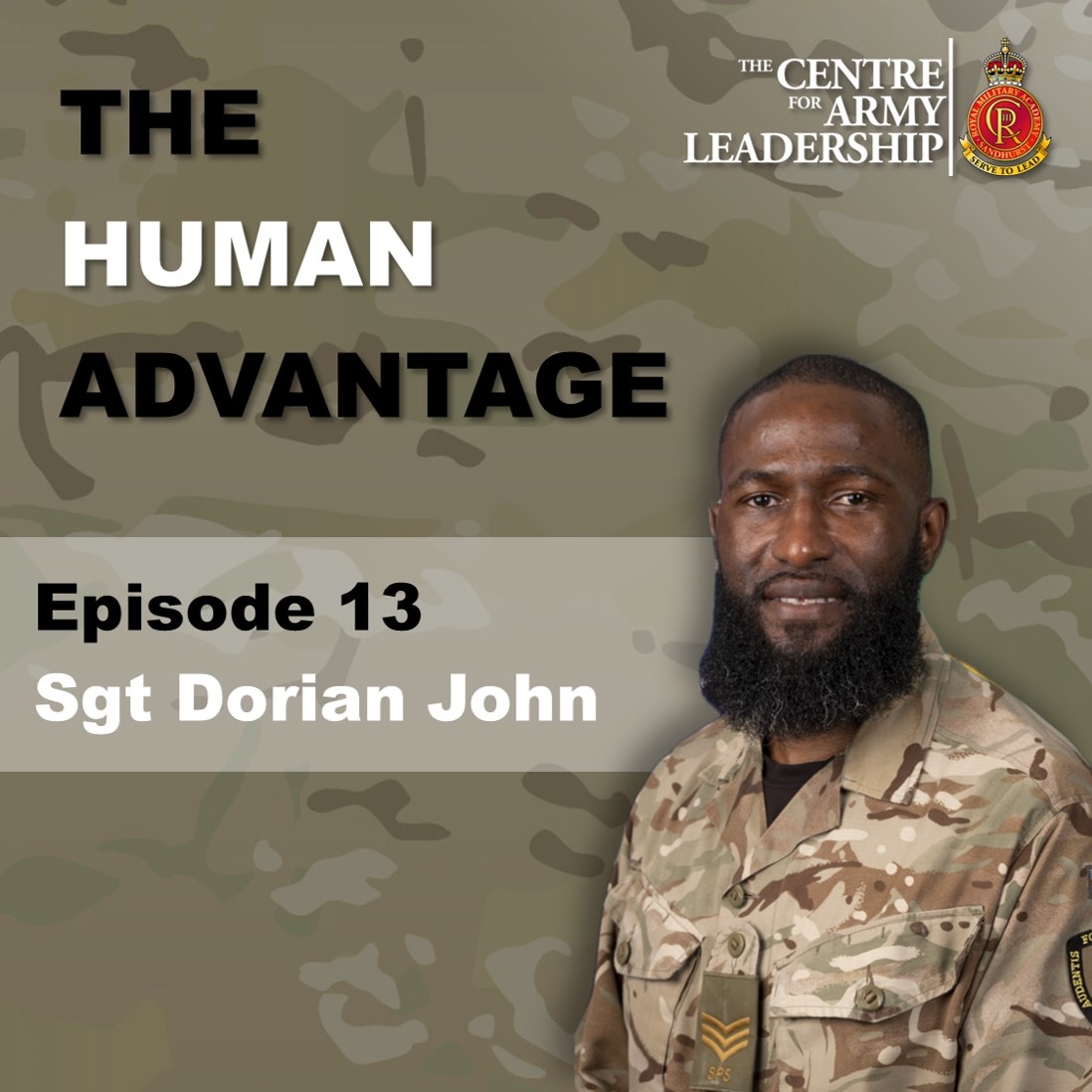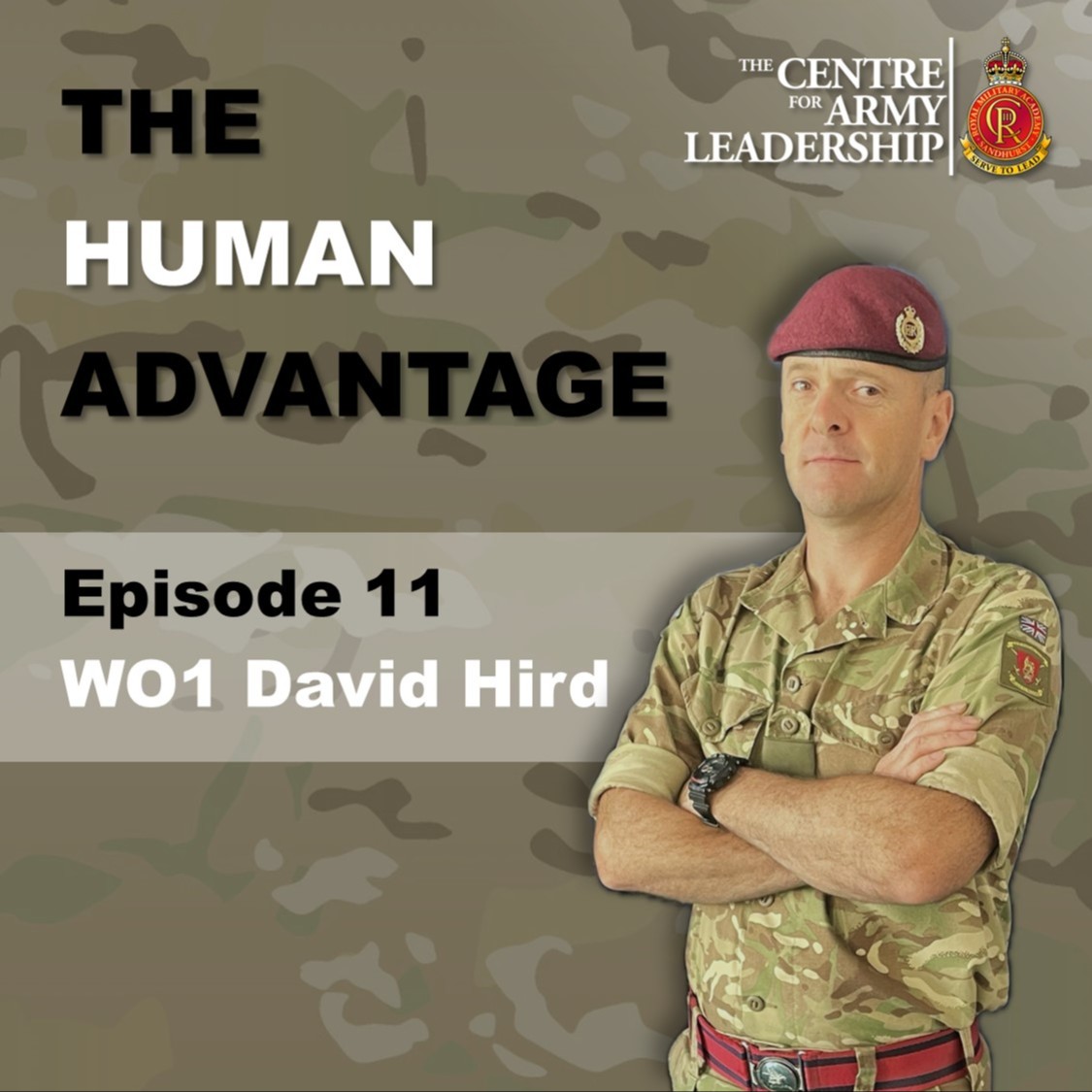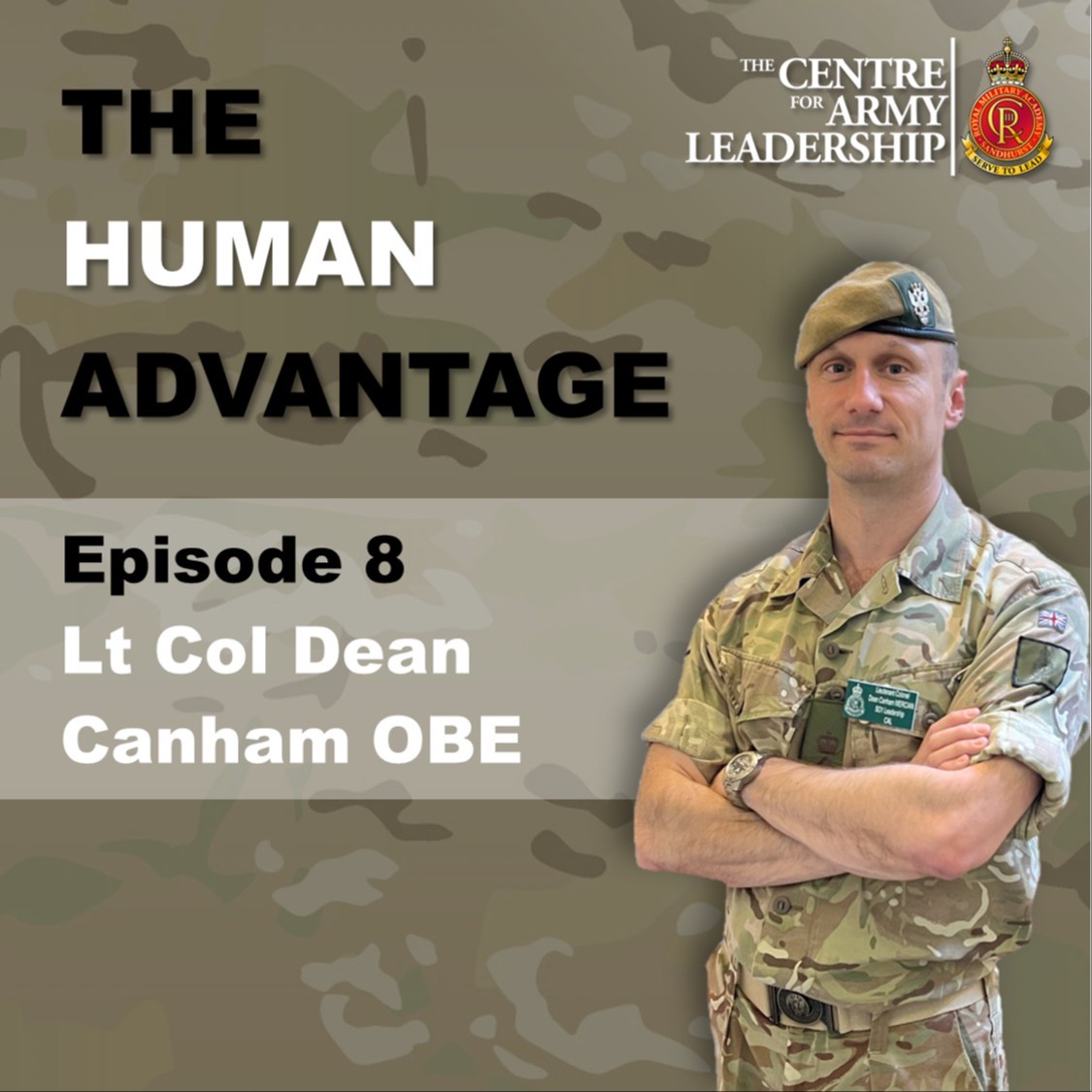Discover The Centre for Army Leadership Podcast
The Centre for Army Leadership Podcast

The Centre for Army Leadership Podcast
Author: The Centre for Army Leadership
Subscribed: 213Played: 6,365Subscribe
Share
© Copyright 2023 All rights reserved.
Description
Drawing on over 300 years of British Army leadership experience, ’The Centre For Army Leadership Podcast’ looks to get to the heart of what is required of our leaders and our leadership, to meet the challenges of both today and tomorrow.
For the British Army leadership underpins everything that we do. It not only ensures we do right by our people, but critically it underpins our operational success. This Podcast Series seeks to harness diversity of thought and experience, from leaders across the military, sport, academia and business worlds, stimulating debate, awareness and critical thinking.
Leadership matters to us all and our successes, and indeed our failures, are so often defined by how well we are led, or indeed by how well we lead.
We hope by sharing our experiences and by learning from others we can promote the value of great leadership, and together we can develop ourselves, our teams and in turn the society in which we live.
For the British Army leadership underpins everything that we do. It not only ensures we do right by our people, but critically it underpins our operational success. This Podcast Series seeks to harness diversity of thought and experience, from leaders across the military, sport, academia and business worlds, stimulating debate, awareness and critical thinking.
Leadership matters to us all and our successes, and indeed our failures, are so often defined by how well we are led, or indeed by how well we lead.
We hope by sharing our experiences and by learning from others we can promote the value of great leadership, and together we can develop ourselves, our teams and in turn the society in which we live.
96 Episodes
Reverse
In this episode, our host Ash Bhardwaj speaks with Captain Zoe Spicer of the 1st The Queens Dragoon Guards, an inspiring leader with a wealth of experience in leadership, development, and mentorship across her military career. Notably, Zoe made history as the first Woman to commission into the QDG, and acts as the Royal Armoured Corps Servicewomen's Representative, championing the voices of women across the Corps.
Capt Spicer shares her journey through the Army, reflecting on pivotal moments that have shaped her leadership philosophy. From leading teams in the challenging operational environment of Op NEWCOMBE in Mali to mentoring junior soldiers and officers, her experiences highlight the multifaceted nature of military leadership.
She emphasises the importance of fostering trust within teams, empowering individuals to take ownership of their roles, and embracing adaptability in the face of uncertainty. For her, leadership is about creating an environment where individuals can thrive and work towards collective success.
This episode provides a deep dive into the practical application of leadership principles, seen through the lens of her impressive career. Her insights into decision-making, resilience, and team cohesion offer valuable lessons for leaders in all walks of life.
Join us as we explore how leadership is about more than just rank and responsibility—it's about breaking barriers, nurturing potential, and leading with authenticity.
A brilliant episode from our archives, full of excellent recommendations for managing your finances around the festive period:
In this episode, our host Captain Ash Bhardwaj speaks to the person behind the The Savvy Squaddie YouTube Channel, Corporal Cameron Eden, who enlisted in the King's Royal Hussars (KRH), before transferring to the Royal Logistic Corps (RLC) to follow his dream of becoming an Army Photographer. With a wealth of experience, deploying to France, Estonia, Afghanistan, Kenya, Finland, America, Canada, and Antarctica, we explore why self-leadership and self-discipline are vital when working autonomously, and how approaching every task with the right mindset and seizing opportunities can lead to remarkable outcomes.
Through his YouTube Channel, the Savvy Squaddie, Cameron has helped thousands of serving and veteran military personnel take control of their personal finances. We also explore the topics of followership and teamwork around a shared purpose, and how knowing your own strengths and weaknesses can aid your self development.
In this episode we speak to Sergeant Ashley Siddall of the Royal Army Medical Corps (RAMC). He began his career at the Army Foundation College Harrogate, at the age of 16, culminating in him joining the RAMC. After completing his trade training as a medic, providing pre-hospital care, Sgt Siddall joined 16 Medical Regiment, and has since deployed to Afghanistan on Op HERRICK 13, has served on Op OLYMPIC in London, and on operations in Somalia. He proceeded to complete the Black Serpent course to provide medical support in the joint service environment, before being attached to various combat regiments, including The Queen's Dragoon Guards (QDG) and 1st Battalion The Duke of Lancaster's Regiment (1LANCS), where he worked in their Regimental Aid Posts on operations, exercises and in barracks. Ash is now posted to 22 Multi Medical Regiment, as a Troop Sergeant to 32 (A) Squadron.
We discuss his leadership journey, and the significance reflection has played in allowing him to develop, and re-frame his approach to leading, as well as the negative impact that toxic leadership has on junior leaders finding their leadership style.
In this episode, we speak to Major David Love, Royal Military Police (RMP), in his role as SO2 Army Leadership at the Centre for Army Leadership (CAL).
We discuss how the CAL are developing the concepts and theory of leadership into tools that the Army can use. He focusses on the importance of understanding your people, and how by taking a human-centred approach to leadership enhances unit and team cohesion, as well as drawing upon the strengths of each individual to achieve greater operational outputs. We also discuss the role of unit identity and the importance of creating the feelings of belonging to forge a cohesive team. Underpinning all of this was understanding the role that empathy plays, firstly by reflecting on examples of where he had been led poorly and being able to evaluate that to shape how he would lead when he was given that responsibility.
In this episode we speak to Lieutenant Colonel Ed Fraser of the Duke of Lancaster's Regiment, formerly the 1st Battalion The King's Regiment, which he commissioned into in 2001. He served in Afghanistan on Op HERRICK, and twice in Iraq on Op TELIC. Away from regimental duty, Lt Col Fraser instructed as a Platoon Commander at the Royal Military Academy Sandhurst, was a Staff Officer in the Army HQ Operational Training and Advisory Group and served as a Military Assistant to the Commanding General US Army Europe. He also led a Mission Support Team for the African Union Mission in Somalia on Op TANGHAM. He attended the Advanced Staff and Command Course at the Defence Academy before his tenure as Commanding Officer of the 4th Battalion The Duke of Lancaster's Regiment, which saw him oversee their contribution to Op INTERFLEX.
We discussed Lt Col Fraser's self-awareness of his leadership style and how it has developed over time, drawing on two particular examples from training prior to Platoon Command. He comments on competency, the ability to do your job from a technical perspective and knowing your your craft entirely, and the necessity of pairing it with human understanding - knowing your people and what makes them 'tick'. Lt Col Fraser recognises the significance of identity and creating a shared purpose, and references to the experience of creating sub-unit identities which aligned with the purpose of training Ukrainian soldiers, on Op INTERFLEX, to facilitate operational effectiveness across the whole team.
In this episode we speak with Lieutenant Colonel Simon Farebrother MC. Simon commissioned in 2001 into the Queen's Dragoon Guards (QDG) - a light cavalry regiment that specialises in reconnoissance. He served on operations on Op BANNER in Northern Ireland, on Op HERRICK in Afghanistan, and on Op TELIC in Iraq. His troop was attached to 3 Commando Brigade during the initial invasion of Iraq in 2003, for which Simon was awarded the Military Cross (MC) for gallantry.
Away from regimental duty, he was a Troop Leader at the Army Training Unit in Winchester. He later taught newly promoted Majors on the Intermediate Command and Staff Course (Land) at Shrivenham, before attending the Advanced Command and Staff Course himself. He later commanded the Army Foundation College at Harrogate throughout the COVID pandemic, and is now Deputy Chief of Staff at the Royal Military Academy Sandhurst (RMAS).
In this episode we learn how the partnership between officers and non-commissioned officers is vital to the Army's performance, and how the organisational culture we create as leaders determines the way people integrate and behave.
In this episode we speak to Major Daljinder Singh Virdee MBE. Major Virdee commissioned into the Royal Army Medical Corps in 2015 as a pharmacist Professionally Qualified Reserve Officer. Following regimental duty with 256 Field Hospital, he re-roled as a Medical Support Officer and went into full-time Reserve service (FTRS). He has since worked in staff roles at Headquarters Regional command, generating forces for deployments and policy and guidance to aid in community engagement and recruiting. Along the way, he developed engagement guides with certain British communities, and codified the dress code for Sikh soldiers.
This episode explores the power of staff work in cultural change and the challenges of teamwork and leadership in the policy environment. We also consider the opportunities for the learning of leadership in the British Army, which is otherwise omitted based on assumption of understanding in some civilian occupations.
In this episode we speak to Doctor and CAL Senior Research Fellow, Lieutenant Tess Morris-Paterson PhD, about what we can learn from her experience in the selection, training, and preparation of astronauts for space flight, and how some of those skills can be applied in a military context to her experience as a Troop commander with 135 Geographic Squadron Royal Engineers.
Lt Morris-Paterson joined the Army Reserve in 2018 and completed trade training as a combat engineer before commissioning as an officer at the Royal Military Academy Sandhurst. In her civilian career, Tess has worked in elite and professional sport for twelve years, working with Olympic and Paralympic athletes as well as those, in the Premier League and Formula1. In 2019 she began working in Human space flight, culminating in a stint at NASA's Ames Research Centre. Tess obtains a PhD in aerospace physiology, and founded her own company, AstroPerform, which specialises in the selection and training of astronauts for space flight. She draws on her experience to highlight the importance of attacking difficult conversations, as soon as possible, and the significance of efficiently providing emotionally intelligent feedback at all levels.
In this episode Captain Ash Bhardwaj speaks to Lieutenant Colonel Liz Kagoda of the Queen Alexandra Royal Army Nursing Corps. Lt Col Kagoda trained and qualified as an emergency nurse in the National Health Service, prior to commissioning in 2005 and has since worked at roles 1-4 across the medical support spectrum. She has delivered everything from immediate life-saving measures in the field, through to long term care at military hospitals back in the UK, as well as deploying twice on Op TELIC in Iraq and three times on Op HERRICK in Afghanistan. Her experience spans from roles such as team leader to officer in charge of the emergency department. She was promoted to Lieutenant Colonel in 2020, and has since focused on governance and assurance for both firm-based and deploying unit personnel. She is currently SO1 Clinical Operations at 2 Medical Brigade, in Yorkshire. This episode outlines how individuals switch between leadership and followership dependent on context, and how leaders require trust and communication to occasionally step back and allow their teams to deliver a task.
In this episode, we speak to Major Chris Duncalfe and WO2 Adam Croucher about their experience during the Non-combatant Evacuation Operation (NEO) of Kabul - Operation PITTING, while in their respective roles of Officer Commanding (OC) and Company Sergeant Major (CSM) of A Company, 2nd Battalion the Parachute Regiment.
Op PITTING marked the end of 20 years of British military involvement in Afghanistan, fighting against the Taliban following the Al Qaeda attacks in the United States in September 2001. We explore how they prepared their Company in the lead up to likely operations, and speak about their insertion into the country and how the operation progressed. We explore the challenges of the operation from a junior leadership perspective, as well as how intent based leadership (or Mission Command) plays a major factor in fostering responsibility, judgement, adaptability and empowerment of others within the team. Finally, we explore the notion of leading by example, particularly when difficult moral decisions must be made, and the utility of responsible challenge and intelligent disobedience in the face of a dynamic and rapidly changing operational situation.
In this episode, our host Captain Ash Bhardwaj speaks to Sergeant Dorian John about the importance of empathy and rapport in getting things done. Sergeant Dorian John was born in the Commonwealth of Dominica and enlisted into the Royal Signals in 2003 and served on OP TELIC 5 in Iraq and OP HERRICK 6 in Afghanistan as a Lance Corporal Dorian transferred to the Adjutant General Corps, Staff and Personnel Support Branch (AGC SPS). He was attached to 5 Rifles and served on OP HERRICK 15 as a linguist with one of the seven languages he speaks. As a Sergeant, Dorian served in the Joint Casualty and Compassionate Centre in Headquarters British Forces Germany before moving to NATO's Allied Rapid Reaction Corps' support battalion. He's now at Headquarters Allied Rapid Reaction Corps (ARC) and has been recently selected for promotion to Staff Sergeant.
In this episode, our host Captain Ash Bhardwaj speaks to WO1 David Hird, the Command Sergeant Major of the Land Warfare Centre (LWC). He enlisted into the Royal Engineers in 1997, joining 35 Engineer Regiment before moving on to Engineer Search Teams, completing his trade training at 1 Royal School of Military Engineering Regiment in Chatham, and passing All Arms Parachute selection. He has served on Op BANNER in Northern Ireland, Op HERRICK 5 and 11 in Afghanistan, Op TELLICK 9 in Iraq, as well as Op OLYMPIC and exercises all over the world. He instructed at 3 Royal School of Military Engineering Regiment at Minley as a Section Commander, and as a Quartermaster Sergeant Instructor in Combat Engineering Recognisance. He was Squadron Sergeant Major of 17 Field Squadron Explosive Ordinance Disposal and Search (EOD), and Regimental Sergeant Major at 23 Parachute Engineer Regiment. He assumed the role of Command Sergeant Major at the Land Warfare Centre (LWC) in Warminster in April 2021. In this conversation, WO1 David Hird reflects on how his leadership style has needed to evolve in order to keep pace with the changing requirements of a more professional Army, and how good Mentorship helped him build more productive relationships with those in positions of command.
In this episode, our host Captain Ash Bhardwaj speaks to Major Charlie Lee, who was commissioned into the Princess of Wales Royal Regiment (PWRR) in 2006. After Rifle Platoon Command, he deployed on HERRICK 15 in Afghanistan in 2011 as part of the Police Advisory Team. He returned to Battalion as Officer Commanding of the Mortar Platoon, then Battalion Operations Officer. After Staff College and various Staff Officer roles, he took on Sub Unit command of the Second Battalion PWRR, operating in the Specialised Infantry role with operational tours in East Africa. He is currently the Chief Instructor for the Senior Term at the Royal Military Academy Sandhurst. In this conversation, Major Lee reveals how his early mistakes made him explore the balance between being liked and respected and the application of loyalty and integrity to others and the chain of command.
In this episode, our host, Captain Ash Bhardwaj, speaks to Lieutenant Colonel Dean Canham OBE, SO1 Centre for Army Leadership. This conversation with Colonel Dean is a raw and honest insight into the realities of leadership on kinetic operations, and dealing with the consequence of your decisions.
CONTENT WARNING: In this episode, we cover the topics of the deaths of soldiers on operations, improvised explosive devices, and dealing with the trauma of those tragedies. If these topics are difficult for you to hear about, you may want to skip this episode. It is totally natural that the examples given in this episode may affect you, and you may find it useful to speak with someone about how you feel. You can find a range of support resources at the Army's Ask for Help page linked at the bottom of these show notes.
Commissioning in 2000 into the 1st Battalion Worcestershire and Sherwood Foresters, the then Second Lieutenant Canham joined the Regiment on their residential tour of Northern Ireland. He deployed to Sierra Leone on Op SILKMAN and to Afghanistan on Op HERRICK 1 as a Reconnaissance Platoon Commander. Later, he returned to Helmand on Op HERRICK 6 as the Battlegroup Operations Officer. He then Commanded A (Grenadier) Company of the 2nd Battalion the MERCIAN Regiment on Op HERRICK 15, also deploying to the Falklands and leading the 2 MERCIAN contingent at the London 2012 Olympic Games. He took command of 1 MERCIAN Regiment in 2020, and led the Battlegroup in Estonia on Op CABRIT 8 in 2021. He has worked at the Army Personnel Centre (APC) Glasgow, Army Headquarters and the Permanent Joint Headquarters (PJHQ), where he was awarded an OBE for his work in support of operations in South Sudan and Somalia. He has instructed at the Infantry Training Centre Catterick, the Platoon Commander's Division at Brecon, and on the Intermediate Command and Staff Course (ICSC) at Shrivenham. He now heads up the Centre for Army Leadership, based at the Royal Military Academy Sandhurst (RMAS).
The British Army's Ask for Help Page: https://www.army.mod.uk/people/health-wellbeing-welfare-support/health-performance-and-wellbeing-in-the-army/managing-stress/ask-for-help/
In this episode, our host Captain Ash Bhardwaj speaks to Warrant Officer Class 1 Jon O'Neill about the importance of honesty and vulnerability in building trust within teams. He reflects on how adopting a more 'coaching' approach to your leadership style is by far the best way of developing others. Joining the Army in 1999, Jon joined the 2nd Batallion, the Princess of Wales Royal Regiment (2 PWRR). He has served the majority of his career in Light-Role Infantry Companies, holding every appointment from Signaller to Regimental Sergeant Major (RSM), deploying to Bosnia, Northern Ireland, Iraq and Afghanistan. He was RSM of both 2 PWRR and the Mission Ready Training Centre (MRTC), preparing individuals for deployments overseas, before working with the Specialised Infantry Training Group in North and East Africa. He was also an instructor at the Infantry Training Centre (ITC) Catterick, and at the Infantry Battle School on the Platoon Commander's Course. His enthusiasm for all things training and development led him to his current role as the Command Sergeant Major of Army Recruiting and Initial Training Command (ARITC).
In this episode we speak with the British Army's most senior soldier - the Army Sergeant Major, Warrant Officer Class 1 (WO1) Paul Carney. He joined the Army as a Combat Engineer in 1997 and has served on operations in Macedonia, Kosovo, Iraq and Afghanistan. His junior and senior non-commissioned officer (NCO) appointments were spread between Close Support Armoured Engineering and General Support Engineering. He was the Squadron Sergeant Major of 20 Field Squadron in 36 Engineer Regiment, Regimental Sergeant Major at 22 Engineer Regiment, and the Command Sergeant Major of the 3rd (UK) Division. WO1 Carney has instructed Troop Commanders and Sergeants in both demolition and bridging at the Royal Engineer Warfare Wing, and has attended the Intimidate Command and Staff Course (Land) as a WO1. In this interview, we explore the changes in leadership approach as a soldier moves through the ranks, ultimately distilling 25 years of leadership into the phrase 'knowing your people'.
In this episode, our host Captain Ash Bhardwaj speaks to Major James (Jim) Beckett about the process of enabling change within culture and performance by giving teams the space to experiment. Recognising the importance of honesty and humility in leadership Jim also spoke about the need for leaders to display vulnerability in admitting mistakes to encourage others within the team to do the same - a hallmark of high-performing and rapidly learning teams. Commissioning into the Princess of Wales Royal Regiment (PWRR) in 2010, deploying on Operation Herrick 15 in 2011 as a Battlefield Casualty Replacement (BCR). On returning to the UK, he took command of the Reconnaissance Platoon before becoming an Instructor at the Royal Military Academy Sandhurst (RMAS). Following time spect within MoD London and the Joint Force Headquarters (JFHQ) before taking over sub-unit command within the 2nd Battalion PWRR, overseeing their re-badging to the 2nd Battalion the Ranger Regiment.
In this episode, our host Captain Ash Bhardwaj speaks to Colonel Hannah Stoy, who was commissioned into the Royal Corps of Signals in 2001. She went on to command 30 Signal Regiment and the Queen's Gurkha Signals. She is currently the Deputy Chief of Staff Personnel in HQ Field Army where she remains passionate about her family-first approach to leadership. She is also the co-chair of the Army Service Women's Network. Colonel Hannah provides a frank and insightful insight into the value of time and how we, as leaders, can choose to spend it wisely investing in relationships to help create a culture of healthy communication between the team.
In this episode, our host Captain Ash Bhardwaj speaks to Major Luke Turrell, who shares his experience of finishing training and deploying straight to operations in Iraq in a different role to what he had been trained for, without spending any time at his regiment before deploying. Now the Executive Officer at the Centre for Historical Analysis and Conflict Research (CHACR), the independent think tank for the British Army, he is trying to make sure we understand the conceptual component of fighting power. He's also the first to admit that his leadership style has evolved dramatically over time.
The leadership challenges Luke has faced over his career range from taking over an already established team in an operational environment, to commanding a sub unit in a regiment that was due to be disbanded. Luke explains what he has learned about leadership from subordinates and seniors alike, both in the field and in barracks, starting with a dramatic birth announcement, to leadership wisdom from Sean Connery's aide, via rocket attacks in Iraq.....
In this episode, our host Major David Love speaks to Warrant Officer Class 1 Colin Kirkwood shares his experience of rising through the ranks in the Scots Guards to fulfilling the role of Academy Sergeant Major at the Royal Military Academy Sandhurst - one of the most coveted appointments in the British Army.
He talks of his service in Afghanistan as a Sergeant, where, following the unexpected wounding of his Platoon Commander, he quickly found himself in command of the Company’s lead Platoon as they faced a critical assault on the Taliban. He also focusing on the development of trust as the key ingredient to fostering effective teamwork, providing a personal insight into what makes the most effective leaders from his long and distinguished career.


